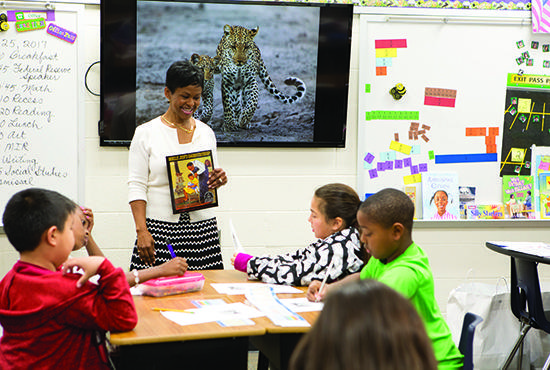Kansas City Fed’s Math X Econ program gives high schoolers insight into economics
During the recent Math X Economics program, which the Federal Reserve Bank of Kansas City hosts annually to highlight the field of economics for high school students, topics ranged from data technology to the influence of probability in games.
More than 40 students from public schools throughout the Kansas City metro, including Washington High School in Kansas City, Kan.; Ruskin High School in Kansas City, Kan.; and Center High School in Kansas City, Mo.; attended the program. The students, a mix of sophomore, juniors and seniors, were greeted by Kansas City Fed President Esther George and Bob Hampton, assistant vice president in Economic Research.
“You are going to hear today from talented people who have dedicated their careers to studying the economy,” George said. “I hope that as you go on in your studies, you will think about the Federal Reserve. Someday I’d like for you to come back and talk to me about why you’d like to work here.”
Throughout the morning, students heard about the field of economics; learned how the Bank uses technology as a tool for economic research; spoke with a panel of employees about how an understanding of economics can support careers in varying fields; toured the Money Museum to learn more about the functions of the central bank; and studied how incentives influence outcomes—an important component of economics.
Terri Redden, who has been teaching business at Ruskin High School for more than 20 years, enjoyed the perspective offered to her students.
“They may not have seen the link between math and economics before this,” she said. “I think you need exposure to different fields to open minds. This could change career decisions—you never know.”
Learn more about educational programming at the Kansas City Fed visit here.
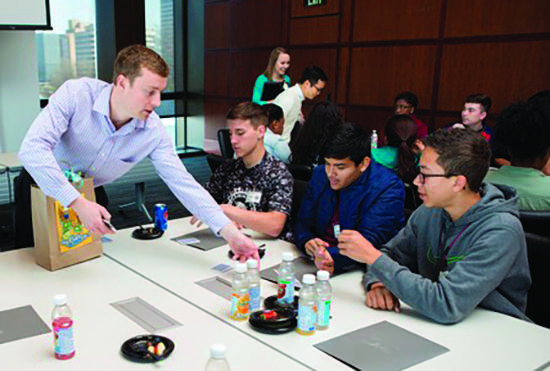
Kansas City Fed to add jobs at Omaha Branch
The Federal Reserve Bank of Kansas City will grow its workforce at its Omaha Branch to support its financial services work on behalf of the U.S. Department of the Treasury. The multi-year plan will include physical improvements to the current building and grounds. When complete, about 100 new jobs will be located at the Omaha Branch, including management, customer service, accounting and information technology positions.
“It is exciting to see this expansion for the Omaha Branch as we reach our milestone of 100 years of service to the region,” said Nate Kauffman, the Omaha Branch executive and economist. “Our growth reflects the Kansas City Fed’s strong commitment to Nebraska and the District.”
As the central bank of the United States, the Federal Reserve carries out fiscal agent responsibilities for the government by partnering with the U.S. Treasury to support programs in the payments, debt management and information management business areas.
Women in Banking forum attended by more than 200 bankers
More than 200 women bankers attended a spring forum the Kansas City Fed hosted in partnership with the Community Bankers Association of Oklahoma and the Oklahoma Banker’s Association in Midwest City, Okla.
“Banking and the Economy: A Forum for Women in Banking” addressed topics critical to bankers and provided industry knowledge and leadership development to enhance careers and networks. The event included an economic update from Kansas City Fed President Esther George.
“I work for an organization that holds you to a high standard,” George said about her career at the Bank. “I learned early on that whatever you do, do it in a way that will help the public better understand the institution you serve.”
Other topics included community banking regulations, cybersecurity, diversity, social media and fraud protection strategies.
The forum concluded with a panel discussion with top women leaders in Oklahoma, moderated by Kansas City Fed Board Chair Rose Washington.
The panel consisted of former Kansas City Fed Oklahoma City Branch Board members Jacque Fiegel and Jane Haskin, and President of United Way of Central Oklahoma Debby Hampton. The discussion covered career advice, lessons learned and words of encouragement.
“When I first started in banking, I rated my success on how others rated me,” Haskin said. “Now, at the end of my banking career, I define success by asking myself each day if I felt that I went to work and used my abilities to the best I could and was I fulfilled in doing so—no one can rate your success but yourself.”
Fiegel noted the difference in representation of women in the male dominated field of banking and how it has changed since she began her career.
“When I started my career, I don’t know who would have been in the room during a conference like this,” Fiegel said.
The panelists reflected on advice they wish they could share with themselves at age 25.
“While you may be given an opportunity because you are a woman, it is what you do with the opportunity that makes you a leader,” Haskin said. “I would tell myself to not be afraid to take on a new role and to be prepared. Knowledge makes you powerful.”
Stay updated with events at the Kansas City Fed.
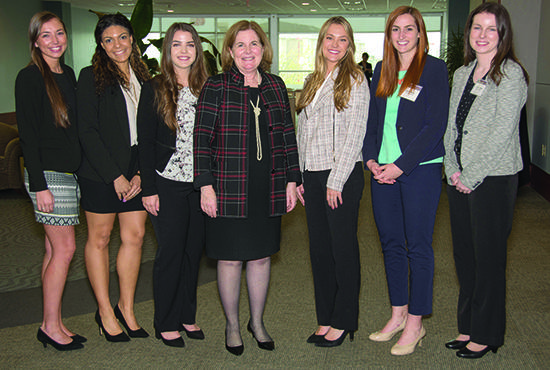
Kansas City Fed plants saplings from Oklahoma City’s Survivor Tree
The Federal Reserve Bank of Kansas City recently accepted two young American elm saplings from the Oklahoma City Survivor Tree, which withstood a domestic terrorist bombing at the Alfred Murrah Federal Building on April 19, 1995. The young saplings were grown from seeds harvested from the tree, which is part of the Oklahoma City National Memorial.
The Kansas City Fed’s Oklahoma City Branch building, which was located on Dean A. McGee Avenue in 1995, just two blocks away from the Murrah building, sustained heavy damage from the explosion. All 225 Oklahoma City Branch employees that day were shaken but uninjured; however, 168 people died as a result of the blast, including 19 children at a daycare in the Murrah building.
The Survivor Tree, badly damaged by the blast and feared lost, has continued to thrive and produce saplings that have been distributed around the country. The first to receive saplings from the tree were the survivors and family members of those killed or injured in the bombing. As the years have passed, the saplings have been shared with others as a testament to and reminder of human resilience. An inscription at the Survivor Tree in Oklahoma City reads, “The spirit of this city and this nation will not be defeated; our deeply rooted faith sustains us.”
Kansas City Fed President Esther George arranged for the Bank to receive two saplings to be planted at its Omaha and Kansas City offices. The Kansas City Fed’s Oklahoma City Branch has moved from McGee Avenue to Oklahoma City’s Leadership Square, where the Bank does not have an outdoor area where a sapling can be planted.
To learn more about the Survivor Tree, visit the External LinkOklahoma City National Memorial website.
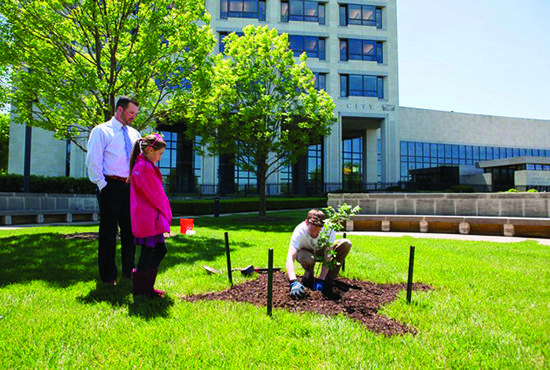
Educational resource introduces kids to entrepreneurship
The Kansas City Fed recently introduced a new online application to help older elementary school students become comfortable and familiar with the concept of running their own business. Building off the Bank’s popular Financial Fables series, Jay Starts a Business takes students into the world of entrepreneurship.
“This interactive experience allows them to choose their own adventure as they walk through the process of starting their own business,” said Tina Ellsworth, a Kansas City Fed education specialist who helped develop the materials. “We invite students to partner with our economic education mascot, Jay Eagle, to learn how to make business and economic decisions.”
This app was created for classroom or at-home use by a unique collaboration of educators, designers, illustrators, developers, and voice talent. A teacher manual provides seven lessons to help extend the adventure into a larger classroom experience that emphasizes the economic concepts featured in Jay Starts a Business.
Visit here to learn more.
George recognized as UMKC Alumna of the Year
The University of Missouri-Kansas City Alumni Association Governing Board recently honored Kansas City Fed President Esther George as UMKC Alumna of the Year. George attended an awards presentation with other recipients of Alumni Awards in May, where she was recognized for her role as president and CEO of the Kansas City Fed.
“Beyond her national leadership in shaping monetary policy, George also is known globally for her expertise,” the committee wrote. “She hosts the annual Jackson Hole Economic Symposium and has participated in the Bank for International Settlements’ Financial Stability Institute programs in Lima, Peru; Abu Dhabi, United Arab Emirates; Beijing and Malaysia. While much of George’s work is national and international in scope, she generously lends her time to UMKC by giving presentations to UMKC Bloch students and inviting them to the Federal Reserve Bank of Kansas City so they can engage with economists and other professionals.”
During her acceptance remarks, George shared how honored she felt to receive the award.
“As I look across this stage today, we are products of UMKC and its commitment to excellence across a range of disciplines,” she said, stressing the importance of the university to the city, faculty, graduates and students.
George also stressed the importance of service to others and how that value has enriched her personal and professional development.
The ceremony recognized other outstanding UMKC alumni, including Kansas City Fed retiree Kathy Webster, who was given an achievement award for her role as national chair of the board of directors for WomenHeart: The National Coalition for Women with Heart Disease. Webster retired as an officer in the Bank’s Facilities Management Department in April 2013.
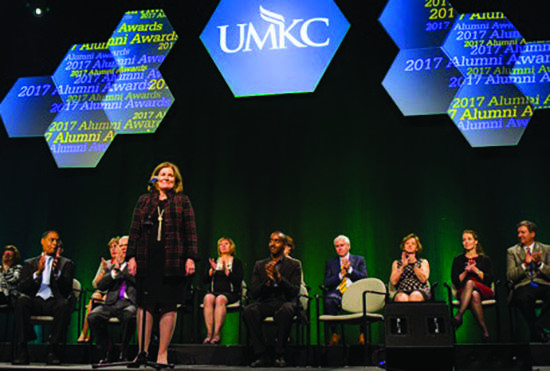
Kansas City Fed’s Money Smart efforts reach thousands
Kansas City’s Money Smart Month has grown since it was founded with seven participating partners in 2008. Today, at least 280 organizations, including financial institutions and nonprofits, participate in and support Money Smart Month.
“Money Smart is unique in that it’s all about collaborative partnerships,” said Krissy Young, a vice president at the Kansas City Fed. “We want to encourage everyone to be smart about money.”
The Federal Reserve Bank of Kansas City dedicates its efforts to promoting and expanding the financial knowledge of adults and children throughout the Tenth Federal Reserve District during Money Smart Month. Many of the events take place in April but also occur throughout the year.
Teach Children to Save is one of the most prominent elements of Money Smart Month. The program, a national initiative created by the American Bankers Association, connects volunteers with classrooms to provide lessons on healthy financial habits for students at a young age (K-3rd Grade). Volunteers from all four offices in the Tenth District participate in the program in some way. Overall, this year in the Kansas City Metro area, 167 volunteers from 13 organizations visited 320 classrooms in 119 schools, reaching approximately 6,830 elementary students.
To kick off Money Smart Month events in Kansas City, the Kansas City Fed hosted the ninth annual Money Smart Day at the Kansas City Public Library. The event attracted nearly 400 people, an increase of nearly 20 percent from 2016, to take advantage of financial education resources and expert advice. Money Smart Day 2017 served as the kick-off event for the month-long Money Smart Month campaign in April.
“Money Smart Day gave me an opportunity to branch outside of my department and interact with people from various divisions of the Bank,” said Paula Odu, a Kansas City Fed employee who volunteered for Money Smart Day. “My experience volunteering at the event gave me insight into the hands-on work the Bank does to promote the value of service.”
Learn how to get involved with Teach Children to Save visit here.
